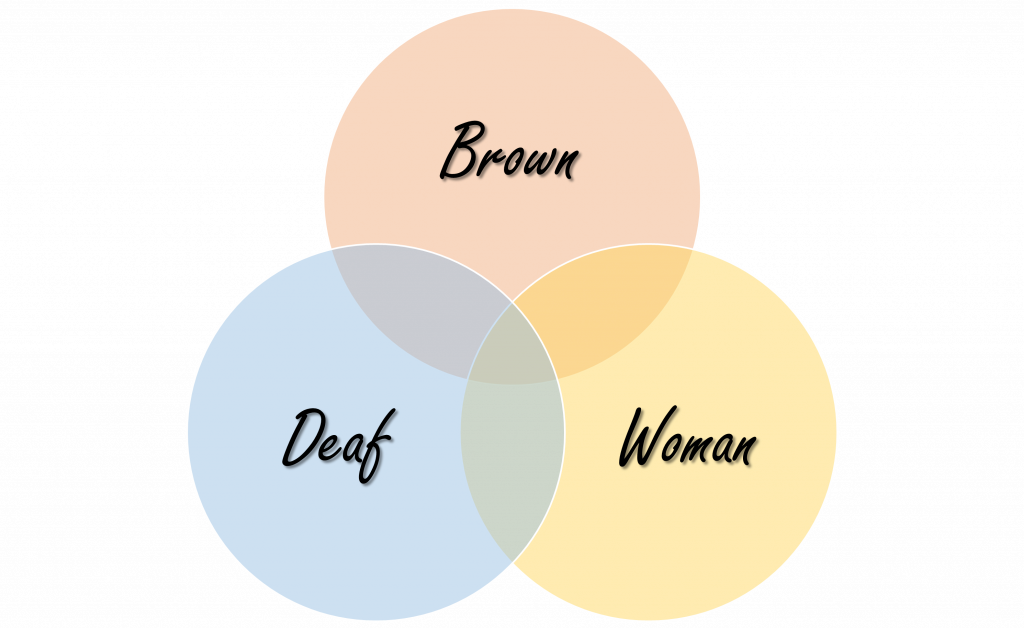Hi everyone! I hope you are doing well, and that the sub-zero temperatures haven’t dampened your spirits. Recently, I have been thinking about how my disability intersects with my race and sex, and how this shapes both my experiences in the world and how other people perceive me. I thought I might write up my musings, and do some research at the same time.
In sociology, intersectionality theory refers to the existence of multiple sociopolitical identities that contribute to a person’s experiences of discrimination and privilege (Crenshaw, 1989). I am a deaf woman of colour, and these identities alter the lens through which I navigate the world.
As a member of multiple communities, it can make it harder to fight for your voice. In particular, disability is hardly recognised in South Asian communities. There is a real need to uphold our reputation such that it is so common to not speak out about physical disabilities, let alone mental illnesses. A research study conducted by the University of Surrey found that South Asian people are 4x more likely to develop a physical disability compared to our white counterparts (Williams, Cox and Cooper, 2020). This is worrying for multiple reasons. If we are stigmatised for not fitting the mould and for speaking out, then who do we go to when we need support?
I am lucky to have parents who have always stood up for me, building up my confidence and encouraging me to ask for help. Still, there are moments with extended family where I have felt it might be better to wear my hair down so they don’t remember that I wear hearing aids. Still, I find myself not talking to my grandparents about the difficult parts of my day, the sadness I felt when I couldn’t hear my friends, the mental health struggles. Still, I try and minimise the pain I might cause by talking about my struggles.
Much of the world lives in a natural state of ignorance. The ‘normal’ person is not taught to be curious about disability and racism. Most people are able to move through the world every day, without needing to understand how much harder it is to move through when the world is set up against us. My white counterparts can watch news reports of the high rates of morbidity and mortality in BIPOC communities during the pandemic, without having to live through the impact of this.

I think about the dangers I face as a deaf brown woman. Often, I walk outside without my hearing aids so I can listen to music. I try to be as aware of my surroundings as I can without my hearing to rely on. Yet, as hard as I try, this has its limits. I feel much more vulnerable to the darkness, knowing that I am perceived as a woman of colour. Why must I keep my hearing aids on for my safety when I deserve to listen to music and walk outside as much as anyone else? I find myself wearing baggier clothes and taking on a more assertive stance. I keep my hearing aids in, and try not to speak another language on the phone. I try and minimise all the parts of my identity that make me vulnerable, and yet, why should I do this? After the murders of Sarah Everard, Sabina Nessa and Zara Aleena, how can I afford not to do this?
So where do we go from here?
I think it’s so important that we listen to people and understand how systems of oppression affect us differently, learn from this, and advocate for others when we can. The disability community is large, and yet, accessibility is largely centred around cis white people. I have barely scratched the surface of how race and disability intersect, and even then, my experience is one small part of a multitude of experiences. We must centre the voices of disabled people of colour. We must be curious about other people’s experiences. We must listen.
Here is some reading if you would like to find out more about the intersection of disability and race:
- Chronically Brown
- To Be BIPOC, Disabled and Fighting for Justice
- Disabled Asian Americans Deal With Racism and Ableism
- You Are Not Entitled To Our Deaths: COVID, Abled Supremacy & Interdependence
- Disabled People Of Color Struggle To Be Heard
- What’s Intersectionality? Let These Scholars Explain the Theory and Its History
- Emily D Williams, PhD, Anna Cox, PhD, Rachel Cooper, PhD, Ethnic Differences in Functional Limitations by Age Across the Adult Life Course, The Journals of Gerontology: Series A, Volume 75, Issue 5, May 2020, Pages 914–921, https://doi.org/10.1093/gerona/glz264


